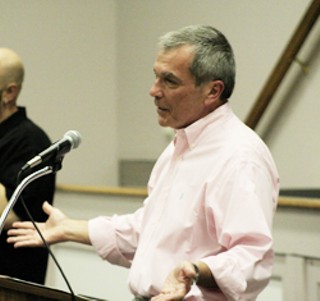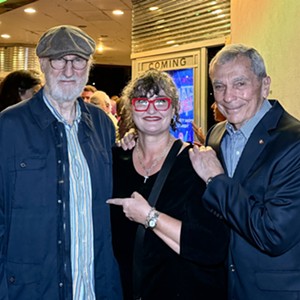EARLIER THIS YEAR, ABC was set to film a pilot episode of a show starring Alyssa Milano as a Savannah lawyer.
The production was all ready to shoot, and indeed one scene with the former Charmed star was filmed downtown.
But then something happened.
“The company calculated their gain from state of Georgia’s tax incentive would be about $300,000 on a $4.5 million project,” says City of Savannah Tourism and Film Services Director Jay Self. “But the state of South Carolina could offer them a check for $680,000.”
So the entire shoot decamped the Coastal Empire and headed for the Holy City, $380,000 richer than when they started. The catch: The script had to be changed to reflect the location.
And that’s how Alyssa Milano became a Charleston lawyer.
“One of the conditions to be eligible for the rebate was to call the setting ‘Charleston,’” Self says. “That’s their payoff.”
Charleston is also the home of the hit new Lifetime series Army Wives, a production that came there in large part due to South Carolina’s film rebate.
“That show’s working entirely out of Charleston,” says Ray Swagerty, production manager for the City of Charleston Department of Cultural Affairs.
“They even established their own studio facility and built their own sets,” Swagerty says. “They converted a building that was formerly a warehouse.”
Charleston’s gains are Savannah’s losses as our long feature film drought enters its seventh year.
Once we were the location of such well-regarded films as Glory and Forrest Gump — not to mention that not-so-well-regarded little number called Midnight in the Garden of Good and Evil. But now Savannah’s resident talent and technicians are lucky to get work on a straight-to-DVD horror film like the recent indie Side Sho.
Michael Shortt owns three local entertainment firms: the talent agency Talent Source, the production company Tandem Productions and the casting and location company Aardvark Production.
“I started my business right before My Father, My Son in 1987 and worked non-stop until The Gift in 2000, then it was suddenly like the well had run dry,” Shortt recalls.
J.R. Reynolds is a local film and video producer, owner of Videoman Productions, and one of the stars of Side Sho.
“Back when Midnight shot here, The Gift, Undertow, a lot more people were willing to move down here and work on movies,” Reynolds says. “Then there was the writer’s strike, and then 9/11, and all of a sudden we weren’t getting any films.”
Stratton Leopold is a Savannah native and movie producer who’s brought films such as The General’s Daughter to shoot in town. He’s currently working on the next Star Trek film for Paramount Pictures.
Leopold says that like most everything else in the movie biz, it all boils down to money.
“It’s an incentive-driven business at the moment,” Leopold says. “On the back cover of these trade publications I get there are these big ads that say: ‘South Carolina: We give you cash.’”
And they mean that literally. Whereas the state of Georgia offers production companies a base tax incentive of nine percent (twelve if you shoot in an economically depressed area like Fulton County), that’s in the form of a credit that can be taken off the company’s bottom line later.
But South Carolina’s much more generous new 20-30 percent incentives are made all the more valuable because they’re rebates, not credits. In other words, the production company gets a big fat check soon after it wraps.
“Savannah has a good reputation,” Reynolds says. “People like it here, they like walking around down here – unless it’s August (laughs). But if a small production can save even six or eight thousand dollars going somewhere else – well, that’s a large chunk of their budget.”
Other regional tax incentives, all better than Georgia’s, range from Louisiana’s whopping 25 percent credit to Florida’s 15 percent rebate to Mississippi’s 10 percent rebate.
“We used to fight Canada for production projects because of the uneven exchange rate,” says Shortt. “Now the fight’s primarily with other states like South Carolina and Louisiana who’ve figured out the obvious: Money talks.”
Louisiana’s huge incentive has immediately paid off for that state, and Shortt says in the zero-sum game that is the movie business that means a corresponding loss for other locations.
“Within four weeks of Katrina, five movies were back at work down there. Even though the city is about 50 percent of what it was, New Orleans is the main location for a new Miami Vice-type program called K-ville which is being shot there with Cole Hauser and Anthony Anderson,” says Shortt.
“I fully expect that show to do for New Orleans what Miami Vice did for that city — and it could have been us,” he says.
“In a perfect world, all areas would have the same incentive packages and the deciding factor would be what it was before incentives existed: location, location, location.”
While everyone we spoke to agrees that Savannah’s one of the most unique locations a production company would ever want, they also agreed that no matter how good the location, at some point financial incentives will tip the scale.
Self says that these days location isn’t as important as it once was.
“Movie people don’t have to get as pure a location as they used to because of technology,” he says. “They may go to a place that’s less than desirable from a production designer’s standpoint, and then use technical effects to get it closer to the location they want.”
Self continues:
“You can come to Savannah and get 360-degree 1850. All you need is to spread around some dirt on the street. But if they go somewhere with a hefty incentive and they’re getting $3 million back from the state — well, it doesn’t take $3 million to build the other side of a street yourself.”
The bottom line, Self says, is that “locations no longer hold the monopoly on locations.”
Not only are Georgia’s tax incentives low on paper, because of how they’re designed they’re also ineffectual in practice.
“Tax credits are worthless to production companies as they generally have little or no tax liability in that state,” Self writes in the 2006 Savannah Film Office report.
“The companies sell the credits to brokers for 65-75 percent of their face value,” Self continues. “The brokers then sell them to domicile corporations such as UPS or Coca-Cola in Georgia.”
Georgia also offers a sales tax exemption on certain productions, but even that’s a headache to get.
“In Georgia the tax break is small, and when you do use it you have problems getting the tax break anyway,” Reynolds says.
“Vendors need to enter a special tax-free ID number. But usually all you have is a piece of paper saying you’re entitled to the tax break,” he explains.
“So I often find myself on the phone to Atlanta when I’m out trying to buy phones, computers, and things like that that are often used in movies. I’ll be at Oglethorpe Mall and have to walk out of one store and go somewhere else, because someone may not be willing to just take that piece of paper and file it without charging us tax.”
Shortt echoes Reynolds’s frustration.
“The production incentives we do have are a big joke,” Shortt says. “In order to get the maximum credit the production needs to be located so far out in the sticks that it would be impossible to shoot a movie — no hotels, no airports, no warehouse locations, no crew, no people.”
The current incentive was passed in 2005 to much self-congratulatory fanfare by Georgia politicians, but was followed a year later by South Carolina’s devastating retort.
In the most recent session of the Georgia legislature, Governor Sonny Perdue had the opportunity to sign a bill into law that would increase the state’s base tax incentive to a much more competitive 15 percent. But Perdue vetoed the bill as part of his ongoing budget feud with fellow Republicans in the legislature.
“I’m so sorry the governor vetoed it,” says Leopold. “The state of Georgia spent quite a bit of money on the Daimler plant, which is just a big field. A film incentive requires no infrastructure, no buildings, no smoke. It’s merely an incentive.”
Shortt is even more direct.
“What we need first and foremost is to be on a level playing field with other states. If that happens Savannah will get projects. People love coming here to work,” he says.
“Until Sonny Perdue and his brain trust get this idea through their tiny little heads, we’re never going to recover.”
But Savannah faces its own issues that have nothing to do with poor decisions in Atlanta — namely a talent pool that’s too small and a lack of readily available equipment.
“We have an excellent location and an excellent climate — what we lack is infrastructure,” Reynolds says. “The crew that’s here is strong but there are too few of us. There’s limited housing, limited office space, and no basic equipment rental. Everything you want you have to bring in from somewhere else.”
Reynolds says those problems are compounded on indie shoots.
“We especially see that problem on the small end of the budget scale. These productions have to find housing, have to rent equipment. All that starts to add up until finally it becomes more cost-effective to go elsewhere.”
Shortt agrees.
“Savannah isn’t deep as a crew town. Everybody who works in our business, with one or two exceptions, who chooses to live here has to travel out of the area to find work. After awhile they just move there because it’s easier to keep working with back-to-back jobs,” he says.
According to Self, when times were good, i.e., before 2000, production companies would pay the estimated ten percent increase in labor costs required to bring in personnel that Savannah can’t provide, because they deemed our beauty and hospitality worth the extra cost.
But that’s changed. As Self writes in the 2006 Film Office report, “The power has shifted from the ‘Creatives’ to the ‘Suits’. In other words, if you don’t have a large incentive, you are not considered. Many projects are now budgeted with specific incentives in mind before a director is hired.”
So should Savannah invest more in infrastructure to attract the film industry? That discussion rapidly turns into a chicken-or-the-egg conundrum: Should such investment come first, or should it wait until more prospects materialize?
Shortt says it’s not enough to adopt a build-it-and-they-will-come mentality.
“With current incentives as ignorantly written and as low as they are, it would take a complete fool to build anything here,” he says.
Shortt says because any public investment would require private partnership, increased funding would be unrealistic.
“You cannot expect private business to make an enormous investment in facilities, equipment and personnel if there are no on-going productions to utilize their goods and services,” Shortt says. “Therefore we will not have a camera house, a grip house, truck and trailer rentals, because there’s no economic justification for them to be here.”
Even on big Hollywood productions, rental houses supply most of the hardware. To stay in business, their equipment has to be rented at least 75 percent of the time.
“Most people don’t realize how expensive movie equipment is,” Shortt says. “A camera dolly is valued at $40-$70,000, a film camera package can easily be worth over a million dollars.”
Reynolds says even the smaller-scale craft services, like props, require far too much capital to be a good investment here.
“A props truck by itself costs over $100,000, and what’s in it costs even more,” he says. “Nobody’s going to just go out and buy that on their own.”
Before entering politics, Chatham County Commission Chairman Pete Liakakis was active in the film industry, even serving as Burt Reynolds’s personal bodyguard in the ‘70s.
He says any significant public investment in trying to attract the film industry could easily turn into a waste of taxpayer money.
“You’ve got to be careful about putting something like that together,” Liakakis says.
“A soundstage studio here could be ideal, but you’ve got to make sure things are in place so it’s profitable, so that it’s not something you’re going to have a number of people working on a yearly basis that aren’t being paid for.”
Savannah currently has its own film office, headed by Jay Self, which bears much of the responsibility for recruiting film and TV projects.
Liakakis says that’s part of the problem.
“The situation is that our film office is not aggressive enough and not doing the things that are necessary to really entice people,” he says.
Liakakis says a more comprehensive marketing effort, highlighting the city’s locations and willingness to work with production companies, would pay dividends.
However, Self maintains he already spends the bulk of his time recruiting. Complicating his job is the reality that “the majority of the projects we actively recruit are not funded. More than 60 percent of them will never get made,” he says.
Reynolds says one area the local office needs to improve is its liaison with local technicians. Currently, he says, there is no master resource or job line to consult to find out about current opportunities.
“You have to chase down contacts yourself,” he says. “You have to keep calling and asking if there’s work. And sure enough, the one time you don’t call every three or four days, you’ll finally get somebody on the phone and they’ll say, ‘Oh, yeah, there was something available a few days ago, but it’s filled now.’”
The Savannah Film Office has recently unveiled an internet-based production directory of local media crew and production service companies. The idea is that local crew will enter their information at www.savannahfilm.org/myinfo and production companies can view it when they’re staffing a project.
However, the directory only allows contact in one direction — company to worker — and hence still doesn’t address the concern that local workers don’t have a centralized way to pursue job opportunities on their own.
As you might expect, Charleston does things differently. Ray Swagerty with that city’s Department of Cultural Affairs says Charleston doesn’t do any film recruiting at all.
“My office is chiefly occupied with permits and traffic management, and making sure the residents of Charleston aren’t unnecessarily inconvenienced by any projects that come to town,” Swagerty says.
Instead, all TV and movie recruiting for Charleston is done through the South Carolina Film Office, based in the state capital of Columbia.
Far from being offended by that, Swagerty welcomes the division of labor.
“That doesn’t bother me in the least,” he says. “I’ve come to know all those folks in Columbia, and they’re down here periodically, so I get to put a face with the name.”
Swagerty says it’s not always wise for a city to take on the task of recruiting film.
“Charleston doesn’t actively recruit, and one reason for that is we don’t have anybody down here with expertise to do that sort of thing,” he says. “We have people in the economic development office who are certainly good at recruiting businesses, but film’s a different animal. Somebody needs to know about the industry to be a good recruiter.”
While centralization clearly works for Charleston, it’s also true that South Carolina’s a much smaller state than Georgia. And as any south Georgian will tell you, Atlanta may as well be on another planet for all it cares about anyone or anything below Fulton County.
“We can’t trust the state of Georgia to favor us over the rest of the state, and they wouldn’t anyway,” Shortt says. “Atlanta needs and wants production work too. Atlanta will always take care of number one first and give us leftovers.”
Shortt, who was on the Savannah Film Commission when Self was hired, says the current model is just fine.
“Our original goal for the office was simple: Bring more work to Savannah. I can’t suggest that we abandon our original goal. It was sound then and still is a sound goal today,” he says.
“If by some miracle we were to get equal tax incentives, we’d need our film commission more than ever,” Shortt concludes.
So is anything going on in Savannah?
Self says print business, i.e., photo shoots for product catalogues, is humming right along. Companies like Land’s End, H&M, Chadwick’s of Boston, Chico’s, and Boston Proper have all come down to shoot for catalogues recently.
“It’s not big glamorous movie stars in Johnson Square, but they’re spending a bundle here,” Self says. “We have more projects per year now than we did back in the ‘90s when we had a few big movies.”
Indeed, his office’s report indicates that overall film, video, and still photography spending in Savannah in 2006 was four times that of 2005.
Lest we overstate Charleston’s success, it should be pointed out that they’re experiencing a similar phenomenon.
“The bulk of what we do is not TV productions or motion picture,” Swagerty says. “The bulk of what we do nowadays is still photo shoots and catalogue shoots.”
But Shortt, who’s holding a casting call Sept. 1 for an upcoming American Girl catalogue shoot, characterizes the print jobs here as more of “a trickle.”
Self says commercials aren’t coming to Savannah like they used to.
“Part of it is the changing trends in the commercial industry. Fewer are shot on location. And a lot of commercials are made using digital techniques,” says Self.
“Also, commercials go where there’s lots of talent. Bud commercials are about people drinking beer, not about where they are. We don’t have the talent pool Miami has, for example,” he says.
Savannah once attracted a lot of car commercials, but Self says “the American car industry is cutting back on ads as well. They’re very expensive.”
Calling the current environment for commercials “a weird place right now,” Self says “With all this online advertising, and ad rates going up but individual viewership going down, there’s a lot of turbulence in the advertising world.”
And now we come to the key question: Do we really want to compete for film and TV productions in such a treacherous climate?
Would we be better off concentrating on less fickle, home-grown industries?
One player in the local economy who wished to remain anonymous for this article says we should take the latter course.
“Should we be spending our time trying to get four or five people permanent full-time jobs here, so they’ll buy a house and contribute to the economy 365 days a year, or should we spend our time trying to get 300 people to come here three months and then leave, spending their paychecks back in California or wherever they came from?” the insider asks.
To which J.R. Reynolds replies, “I guess that depends what business you’re in. If you sell houses or work in real estate, I guess looking at that longer term is good.”
Reynolds says the better mindset is to think of movie workers as tourists.
“They take up hotel rooms, they go out to eat in restaurants. Those workers pay sales tax on those purchases but don’t use the services, which is a great deal for us,” he says. “The movie business builds a buzz about the city and because of that has a significant impact on tourism.”
Liakakis tends to agree.
“The movie business is a nonpolluting industry. They buy a large amount of supplies, they hire local people to work on movie sets, they spend a lot of money while housed here in hotels, they spend money on food,” he says. “The list goes on and on.”
Perhaps surprisingly given his position, Self says we’d be better off not indulging in what he calls “the race to the bottom” in the competition to offer tax incentives.
“Some states have decided they’re OK with losing money on this. That I don’t believe is sustainable,” Self says.
In fact, Self says he’s content to play a waiting game.
“South Carolina actually just decreased their incentive, which we kind of predicted,” he says. “Some states are going, ‘wait a second, let’s wait until things come back down.’ My hope is that once those numbers get back to a reasonable level, we will not be at the disadvantage we’re at now.”
Liakakis is not enamored of that strategy, however.
“I understand the issue with the incentives, but the thing is you still need to take the lead,” he says.
But Self, who’s also tasked with increasing tourism here, takes a fairly holistic approach to the entire issue.
“A lot of people want to attribute tourism growth in Savannah to something, so they attribute it to ‘The Book’ and ‘The Movie,’” he says, referring to the Midnight phenomenon.
“That did have positive effect, but we wouldn’t be at 1992 tourism numbers now if the book had never been published. Cultural tourism and heritage tourism have grown nationally as a trend,” Self maintains.
“We’ve benefited from many different things. It’s like saying the only reason downtown is vibrant is because of SCAD. The truth is, Savannah was already fertile ground,” he says.
“It’s not just tourism, it’s not just SCAD, it’s everything. All these things feed off each other — it’s called critical mass. We’ve been teetering on that line for 10 years.”
We’ll give the last word to Savannah’s most notable film figure, Stratton Leopold. Not surprisingly, he says we’d be fools to stop trying to get movies here.
“I produced a movie in Vancouver called Paycheck. While we were shooting that, there were four other movies also shooting in Vancouver, all in the $100 million range. That’s half a billion dollars in production in one medium-sized city,” Leopold says.
“That means at least $160 million directly into that economy. But more importantly, there are those multipliers that economists use to show how many times a dollar turns over once it joins the economy,” he says.
“The point being that there’s a reason to try and attract film.”
Leopold, who also owns a popular ice cream shop on Broughton Street bearing his family name, says one important but underrated long-term impact of the movie industry is that it helps build other local, small businesses.
“There’s at least one person in Savannah that has a tour company based purely on the movie business here. At least one book was published here on films and where they were shot in Savannah,” he says. “Those are examples of private enterprise that decades after the films are still generating revenue for people in the city.”
Leopold concludes with a vignette from his shop showing the real-world impact of the largely fictional world of the movies.
“I get people all the time coming in the shop asking, ‘Could you tell me where such-and-such film was shot? So we start talking, and I’ll show them the artist’s rendering of The Crab Shack on Tybee, where we shot The General’s Daughter,” Leopold relates.
“And I explain this to them as they’re enjoying their Tutti-Frutti,” he laughs. 
To comment e-mail us at


































